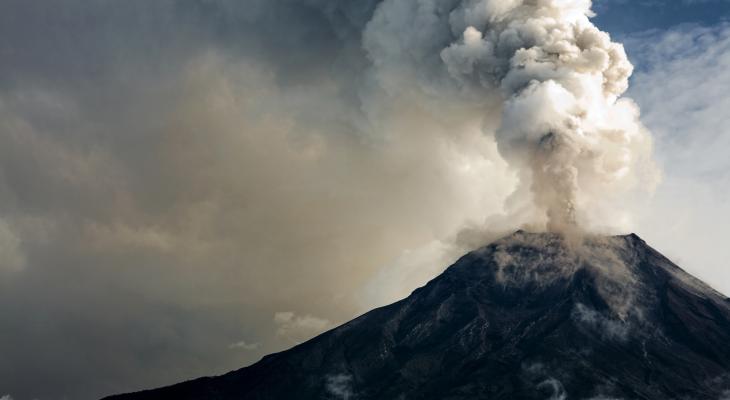Why Do Volcanoes Cause Earth's Climate to Get Colder
The gases and dust particles thrown into the atmosphere during volcanic eruptions have influences on climate. This effect causes the surface temperature of the earth to ever so slightly drop.
Why Do Volcanoes Cause Earth S Climate To Get Colder Quora
These cooler temperatures were caused by large amounts of volcanic sulfate particles injected into the upper atmosphere Sigl added shielding the Earths surface from incoming solar radiation.
. But eruptions also impact the atmosphere. Why do volcanoes cause earths climate to get colder. Volcanic eruptions can influence climate and global temperature because of the gases and dust particles spewed into the atmosphere during the eruption.
When large volumes of ice on top of volcanoes melt the pressure above the magma chamber decreases. Earth Human World Heres why volcanoes are so dangerous. However human contributions to the carbon cycle are more than 100 times those from all the volcanoes in the world - combined.
A volcanic winter is a reduction in global temperatures caused by volcanic ash and droplets of sulfuric acid and water obscuring the Sun and raising Earths albedo after a large particularly explosive volcanic eruption. The sun has gone into lockdown which could cause freezing weather earthquakes and famine say scientists. Volcanic eruptions are often discussed in relation to climate change because they release CO 2 and other gases into our atmosphere.
We take a quick look at the role of volcanic eruptions in climate past present and future. Often these mysterious geological features seem to erupt out of nowhere like Mount St. Likewise when volcanoes extrude large volumes of basalt the rock weathering that follows can cool the planet.
Volcanic ash shades sunlight and causes temporary cooling but aerosols reflect incoming solar radiation and can stay in the stratosphere for longer periods. This effect can cause widespread crop. Volcanic eruptions are accompanied by ejection of considerable amounts of matter pyroclastic materials lava and ash.
Throughout earths history volcanic eruptions have punctuated the temperature record. How volcanoes cool the planet By injecting billions of small shiny particles into the air Every time a volcano erupts the average temperature of the Earth drops a little. Sulfates cooling potential is especially strong around Earths equator.
This is consistent with fossil fuel origins. What is ejected from a volcano like ashblocks solar radiation from reaching earths surface. Analyzing 25 years of seismic data from submarine volcanoes Tolstoy and her team found that underwater volcanism affects the climate by emitting varying levels of carbon dioxide into the.
Volcanoes cause Earths climate to get colder because their airborne debris reduce insulation. Most of the particles spewed from volcanoes cool the planet by shading incoming. Following the 1991 eruption of Mount Pinatubo in the Philippines cooler than normal temperatures were recorded worldwide and brilliant sunsets and sunrises were attributed to this eruption that sent fine ash and gases high into the stratosphere forming a large volcanic cloud that drifted around the world.
Since the beginning of the Industrial Revolution rising carbon dioxide in the Earths atmosphere has been associated with a slow decline in Carbon-13. The most significant climate impacts from volcanic injections into the stratosphere come from the conversion of sulfur dioxide to sulfuric acid which condenses rapidly in the stratosphere to form fine sulfate aerosols. Carbon dioxide from fossil fuels is depleted in Carbon-13.
Some of them such as ash and sulphur dioxide have a cooling effect because they or the substances they cause. If these materials are light enough they are ejected to the atmosphere and may stay there for a while thus blocking the incoming energy from the sun. In comparison while volcanic eruptions do cause an increase in atmospheric CO 2 human.
Strangely enough massive volcanoes might be part of the answer. Global warming may cause more eruptions by causing glaciers atop volcanoes to melt. A volcano may look hot but the sulfur dioxide it releases can actually have.
A tiny contribution to global warming. Yes volcanoes can affect weather and the Earths climate. Over time rain wind and chemical changes all eat away at volcanic rocks.
Volcanoes also have an effect on the climate. Volcanic eruptions can affect climate in two main ways. Carbon dioxide from volcanoes shows no special proportion of these two forms.
Volcanoes cause Earths climate to get colder because their airborne debris reduce insulation. Nasa scientists fear it could be a repeat of the Dalton Minimum which happened between 1790 and 1830 leading to periods of brutal cold crop loss famine and powerful volcanic eruptions. Volcanic eruptions are responsible for releasing molten rock or lava from deep within the Earth forming new rock on the Earths surface.
Therefore it lowers the surface temperature. Long-term cooling effects are primarily dependent upon injection of sulfur gases into the stratosphere where they undergo a series of reactions to create sulfuric. Helens which sat quiet for more than a century until it exploded on May 18 1980 spewing lava that melted nearby glaciers causing a mudslide that killed 57 people.
When volcanoes erupt they emit a mixture of gases and particles into the air. Volcanoes are a phenomenon that piques the interest of geologists and everyday people alike. Sulfate aerosols can cool the climate and deplete Earths ozone layer.
A new study in the April 22 edition of Science reveals that volcanic activity associated with the plate-tectonic movement of continents may be responsible for climatic shifts from hot to cold over.

How Do Volcanic Eruptions Affect Climate University Of Illinois Extension
How Does Global Warming Or Climate Change Cause More Intense Polar Vortex And Thus Colder Temperatures Quora

Volcanic Eruptions Can Cool The Planet Global Ideas Dw 27 11 2017
No comments for "Why Do Volcanoes Cause Earth's Climate to Get Colder"
Post a Comment